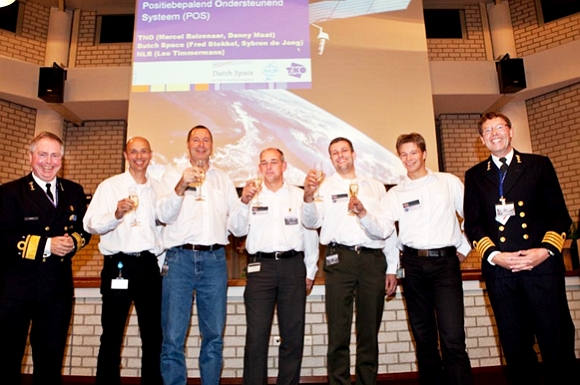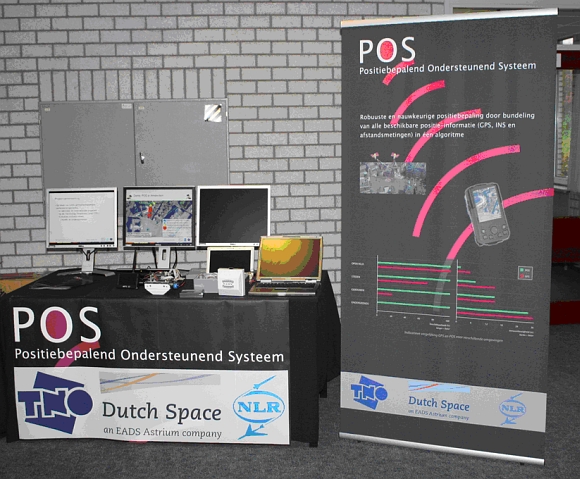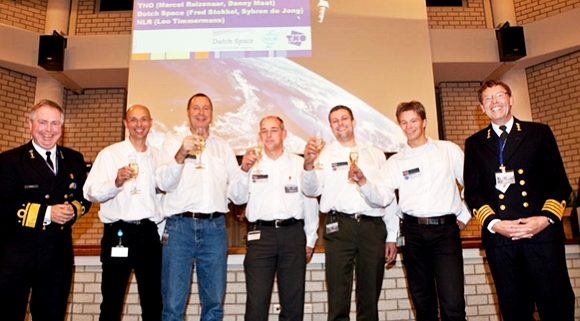
The POS team winner at the Defence Innovation Game 2010. From left to right: Klaas Visser (Chairman of the jury), Leo Timmermans (NLR), Marcel Ruiz to (TNO), Fred Stockel (DS), Danny Size (TNO), Sybren de Jong (DS), Rob Dekker (DR&D organizer Innovation Game)
The Position-Determination Support System (POS) team representing TNO, Dutch Space and the National Aerospace Laboratory (NLR) was a recent winner at the Defence Innovation Game 2010. The team’s winning project proposal involves a partnership between TNO, Dutch Space and NLR.
The objective of POS is to help make the military less dependant on satellites for determining troop positions. Satellites can be destroyed or malfunction, and satellite reception in buildings is sometimes unavailable or only sporadically available. The POS concept intelligently combines three existing systems: GPS, inertial navigation, and relative distance determination. Having won the Innovation Game, the team will now further develop the concept in a project partially financed by the Dutch Ministry of Defence.
The POS team’s focus is on developing new software that will allow the systems to collaborate with one another. The project results should lead to the development of a transponder (transmitter-receiver) for individual infantrymen. This transponder will allow troop positions in the field to be more accurately determined, while also reducing dependency on satellites.
The objective is for POS to operate using the existing hardware that will become available in the near future. Intelligent algorithms will help link the various systems together, thus allowing the systems to collectively compensate for any deficiencies in an individual system. As input, the POS features GPS, inertial navigation and relative distance determination, which is expected to be expanded in future to include other position information.
TNO is responsible for developing the POS algorithm and has already developed the Active Ranging and Tracking System (ARTS) that will be used for distance determination. NLR’s role within POS is to set up the simulation environment and related data in order to test and analyse the various scenarios. Dutch Space, which sees potential commercial applications for POS within its parent company, EADS, is responsible for the system engineering elements and software development.
 Defence Research and Development (DR&D), the department within the Defence Material Organisation that organised the 2010 Innovation Game, aims to use this ‘game’ as a means of encouraging the Ministry of Defence, knowledge institutes, such as TNO, NLR and MARIN, and industry, to generate ideas related to the particular challenges facing the armed forces. Last year NLR was also one the Innovation Game’s winners.
Defence Research and Development (DR&D), the department within the Defence Material Organisation that organised the 2010 Innovation Game, aims to use this ‘game’ as a means of encouraging the Ministry of Defence, knowledge institutes, such as TNO, NLR and MARIN, and industry, to generate ideas related to the particular challenges facing the armed forces. Last year NLR was also one the Innovation Game’s winners.
The prize consists of an NTP contract for developing a proof-of-concept (TRL-level 3), in which the developed algorithms, supported by simulations, and some signals measured in actual practice, will be used to verify that the concept contains the required properties. The project was also featured at the NIDV exposition in Rotterdam


